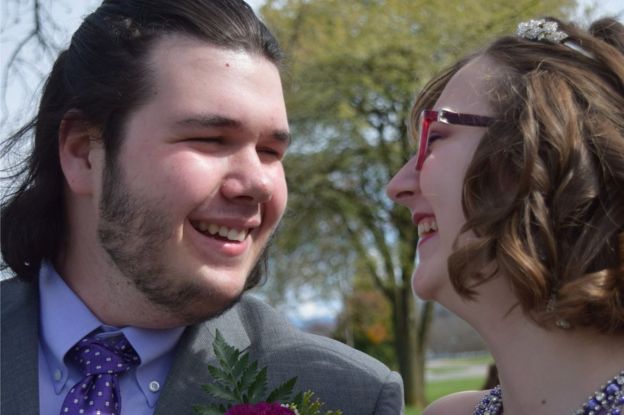President Donald Trump said on Tuesday that it was a "difficult" and "scary" time for young men in the US and mocked a woman who says she was assaulted by his Supreme Court nominee Brett Kavanaugh.
Mr Trump was expressing support for Mr Kavanaugh as the FBI investigates claims of sexual misconduct by several women, including Christine Blasey Ford, against the judge.
The remarks come a year after the #MeToo movement toppled prominent Hollywood figures and thousands of women shared their experiences of sexual harassment.
Donald Trump Jnr has also said he is more worried about his sons than his daughters.
Is the president right? Do young men feel under threat, and have any changed their behaviour and views in the past 12 months?
Self-reflection
Drake King, an 18-year-old student from Tennessee, told the BBC that he did not feel scared as a young man in college.
"I feel comfortable with this social change - it helps me realise what I've been doing wrong as a man. Self-reflection is something that most people need," he says.
Explaining how he felt he had acted disrespectfully towards women in the past, he believes the guidelines on what is and isn't OK are now clearer: "It helps to have someone tell me what I am doing wrong."
The feeling that #MeToo was a learning experience for young men is echoed by 21-year-old Ohio student Parker Smith.
"Genuinely listening to these perspectives has led me to reflect on my own. #MeToo has helped make me more cognisant of how I handle myself.
"#MeToo has led me to do a better job of listening, which has, in turn, prompted me to be more self-reflective and aware of how women perceive my own actions and those of other men."
Court of public opinion
But many advocates of change also express reservations.
"When the #MeToo movement started a year ago, I thought it could only be a net gain. But too many mess-ups have happened. I think it's wrong that it has moved away from a legal court and into a court of public opinion," says Drake King.
"In my own circle of friends, those who are single feel extremely apprehensive about dating - especially if a bad date may have the potential of being interpreted as assault."
Anxiety about false accusation is at the forefront of some young adults' minds.
One 2010 study found that 2-10% of rape accusations in the past 20 years were proven to be fake. That does not include unsubstantiated accusations where an investigation was unable to prove a sexual assault occurred, so an accurate figure for the total remains unknown.
"I was pretty sure sexual assault was more common than society was willing to admit, but I also am fairly certain that false accusations are more common than most of the #MeToo activists would like to think," suggests Aiden, a 23-year-old student in Arizona.
He admits he is more cautious now, including keeping both hands visible in group photos with women.
- 'Christine Blasey Ford is a liar' - Trump supporters
- Ford's testimony through the eyes of a survivor
- What is it like being falsely accused of rape?
"If society has the duty to protect women from the extreme minority of men who are offenders (and it does have that duty), shouldn't society also protect men from the extreme minority of false-accusers?" he adds.
"I'm hearing, 'if you don't believe her claim, you are re-victimising her'. Since scepticism of a claim is heterodoxy, people will accept a claim either blindly or just to avoid being ostracised."
In the US, one in six women is a victim of attempted rape and government data in 2016 suggested just 23% of assaults were reported.
Fear that public opinion is supplanting legal judgement also worries some young men.
"Frankly, my behaviour hasn't changed at all since the #MeToo movement," says Adam Peterson, a 29-year old father of one in Utah.
Although he is pleased that survivors of sexual assault have a more powerful platform to speak from, he believes the movement is "overblown".
"I don't know anyone, myself included, that hasn't faced unwanted sexual advances. No-one thinks that's right but it's also a far cry from rape. Treating these two very different things as equivalent is a disservice to people that have been through rape," he added.
"Guilty until proven innocent is a scary precedent for anyone not just young men, and publicly saying so is a good thing."
Ask America
- This story came about because of our Ask America series
- It's a way we find new perspectives on big issues or unearth interesting stories happening across the US
- You can sign up for our Ask America newsletter - where BBC readers are sharing stories and asking questions








0 মন্তব্য(গুলি):
একটি মন্তব্য পোস্ট করুন